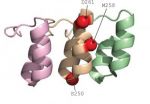(Press-News.org) May 8, 2014 - If you are sending Mother's Day flowers to your mom this weekend, chances are you opted for guaranteed delivery: the promise that they will arrive by a certain time. Should the flowers not arrive in time, you will likely feel betrayed by the sender for breaking their promise. But if they arrive earlier, you likely will be no happier than if they arrive on time, according to new research. The new work suggests that we place such a high premium on keeping a promise that exceeding it confers little or no additional benefit.
Whether we make them with a person or company, promises are social contracts, says Ayelet Gneezy of the University of California, San Diego. While researchers have explored the negative consequences of breaking promises, until now, they have not explored what happens when someone exceeds a promise.
Gneezy became interested in the topic when thinking about how consumers respond to promises made by firms. "My first memory in that respect is that of Amazon's tendency to exceed its promise with respect to delivery time – that is, packages always arrived earlier than promised – and my lack of appreciation of the 'gesture'/fact," Gneezy says.
Gneezy, with colleague Nicholas Epley of the University of Chicago Booth School of Business, set out to explore "promise exceeding" in a series of experiments that tested imagined, recalled, and actual promise-making. In one of the experiments, for example, researchers asked participants to recall three promises: one broken, one kept, and one exceeded. They then asked them to rate how happy they were with the promise-maker's behavior.
While participants valued keeping a promise much more highly than breaking one, exceeding the promise conferred virtually no additional happiness with the promise-maker, as published today in Social Psychological and Personality Science. Additionally, in a follow-up experiment, participants said that exceeding a promise did not require expending significantly more effort.
In another experiment, researchers paired participants, making one the promise-maker and one the promise-receiver. The promise-receiver needed to solve 40 puzzles, being paid for each puzzle solved. The promise-maker promised to help in solving 10 puzzles. The experimenter then instructed the promise-makers to solve either the 10 puzzles (as promised), only 5, or 15.
Although exceeding the promise by solving 15 puzzles clearly required more effort, the promise- receivers did not value that extra work any more than just keeping to the 10 puzzles promised: They valued promise keeping and exceeding equally.
"I was surprised that exceeding a promise produced so little meaningful increase in gratitude or appreciation. I had anticipated a modest positive effect," Epley says, but "what we actually found was almost no gain from exceeding a promise whatsoever."
And the trend held true across the experiments: "Being able to demonstrate our effect so reliably across so many very different methods gives us great confidence in the robustness of these effects," Epley says.
The data suggest that the reason for these effects lies in how we value promises as a society. "Keeping a promise is valued so highly, above and beyond its 'objective' value," Epley says. "When you keep a promise, not only have you done something nice for someone but you've also fulfilled a social contract and shown that you're a reliable and trustworthy person."
The bottom line, Epley says, is that exceeding a promise may not be worth the effort you put in. "Invest efforts into keeping promises, not in exceeding them," he says. And this advice also holds true for businesses, which should prioritize resources to make sure they do not break promises, rather than trying to go above and beyond.
To test this idea further, Epley and Gneezy asked participants in a follow-up study to imagine they had bought concert tickets for row 10 and then either received worse tickets than promised (row 11, 13, or 15), better tickets than promised (row 9, 7, or 5), or exactly what was promised. Participants were more negative about receiving worse tickets but were no more positive – nor more likely to recommend the company – when they received better tickets than promised.
Epley and colleague Nadav Klein are currently working on related work about how people evaluate selfless compared to selfish behavior and they are finding similar results. "Behaving fairly toward others is the critical point," Epley explains. "Beyond being fair, generosity does not seem to be valued as much as one would expect."
So, Epley says: "Don't be upset when your friends, family members, clients, or students fail to appreciate the extra effort you put into going above and beyond your promise. They do not appear to be uniquely ungrateful, just human."
INFORMATION:
The paper, "Worth Keeping but Not Exceeding: Asymmetric Consequences of Breaking
Versus Exceeding Promises" by Ayelet Gneezy and Nicholas Epley, was published in Social Psychological and Personality Science online on May 8, 2014.
The journal Social Psychological and Personality Science is a collaboration from the Association for Research in Personality, the European Association of Social Psychology, the Society of Experimental Social Psychology, and the Society for Personality and Social Psychology, and is co-sponsored by the Asian Association of Social Psychology and Society of Australasian Social Psychologists.
Just keep your promises: Going above and beyond does not pay off
2014-05-08
ELSE PRESS RELEASES FROM THIS DATE:
Universal neuromuscular training an inexpensive, effective way to reduce
2014-05-08
ROSEMENT, Ill.─As participation in high-demand sports such as basketball and soccer has increased over the past decade, so has the number of anterior cruciate ligament (ACL) injuries in teens and young adults. In a study appearing today in the Journal of Bone and Joint Surgery (JBJS) (a research summary was presented at the 2014 Annual Meeting of the American Academy of Orthopaedic Surgeons in March), researchers found that universal neuromuscular training for high school and college-age athletes—which focuses on the optimal way to bend, jump, land and pivot the knee—is ...
Collaboration between psychologists and physicians important to improving primary health care
2014-05-08
WASHINGTON - Primary care teams that include both psychologists and physicians would help address known barriers to improved primary health care, including missed diagnoses, a lack of attention to behavioral factors and limited patient access to needed care, according to health care experts writing in a special issue of American Psychologist, the flagship journal of the American Psychological Association.
"At the heart of the new primary care team is a partnership between a primary care clinician and a psychologist or other mental health professional. The team works together ...
Small mutation changes brain freeze to hot foot
2014-05-08
DURHAM, N.C. -- Ice cream lovers and hot tea drinkers with sensitive teeth could one day have a reason to celebrate a new finding from Duke University researchers. The scientists have found a very small change in a single protein that turns a cold-sensitive receptor into one that senses heat.
Understanding sensation and pain at this level could lead to more specific pain relievers that wouldn't affect the central nervous system, likely producing less severe side effects than existing medications, said Jörg Grandl, Ph.D., an assistant professor of neurobiology in Duke's ...
Statins given early decrease progression of kidney disease
2014-05-08
AURORA, Colo. (May 8, 2014) - Results from a study by University of Colorado School of Medicine researchers show that pravastatin, a medicine widely used for treatment of high cholesterol, also slows down the growth of kidney cysts in children and young adults with autosomal dominant polycystic kidney disease (ADPKD).
ADPKD is the most common potentially lethal hereditary kidney disease, affecting at least 1 in 1000 people. ADPKD is characterized by progressive kidney enlargement due to cyst growth, which results in loss of kidney function over time. At one time, ADPKD ...
Mummy-making wasps discovered in Ecuador
2014-05-08
Some Ecuadorian tribes were famous for making mummified shrunken heads from the remains of their conquered foes. Field work in the cloud forests of Ecuador by Professor Scott Shaw, University of Wyoming, Laramie, and colleagues, has resulted in the discovery of 24 new species of Aleiodes wasps that mummify caterpillars. The research by Eduardo Shimbori, Universidade Federal de São Carlos, Brazil, and Scott Shaw, was recently published in the open access journal ZooKeys.
Among the 24 new insect species described by Shimbori and Shaw, several were named after famous people ...
NASA sees system 91B lingering over southwestern India
2014-05-08
The tropical low pressure area known as System 91B has been making a slow northerly crawl while sitting inland in southwestern India, and NASA's Terra satellite captured a visible image of the struggling storm that showed half of it is over the Northern Indian Ocean.
NASA's Terra satellite passed over System 91B over southwestern India and the Moderate Resolution Imaging Spectroradiometer (MODIS) instrument captured a visible image on May 8 at 05:40 UTC/1:40 a.m. EDT. The despite having a poorly defined low-level circulation center on infrared imagery, the circulation ...
Experimental antibody shows early promise for treatment of childhood tumor
2014-05-08
Tumors shrank or disappeared and disease progression was temporarily halted in 15 children with advanced neuroblastoma enrolled in a safety study of an experimental antibody produced at St. Jude Children's Research Hospital. Four patients are still alive after more than two-and-a-half years and without additional treatment.
Findings from the Phase I study were published recently online and will appear in the May 10 edition of the Journal of Clinical Oncology. The results prompted St. Jude to expand clinical trials of the monoclonal antibody hu14.18K322A to include patients ...
Wake Forest Baptist finds success with novel lung cancer treatment
2014-05-08
WINSTON-SALEM, N.C. – May 8, 2014 – An old idea of retreating lung tumors with radiation is new again, especially with the technological advances seen in radiation oncology over the last decade.
The Comprehensive Cancer Center of Wake Forest Baptist Medical Center is one of only a handful of cancer centers that is attempting to give lung cancer patients out of treatment options a chance to keep the cancer at bay. For these patients, hope lies in a second course of treatment – repeat radiation. Two complementary papers published back-to-back recently in the journal Radiotherapy ...
Health screening for low-income women under health care reform: Better or worse?
2014-05-08
New Rochelle, NY, May 8, 2014—When Massachusetts enacted its own statewide health insurance reform in 2006, low-income women transitioned from receiving free, federally subsidized screening for breast and cervical cancer and cardiovascular disease risk to an insurance-based payment system. The effects on screening rates in this vulnerable population are explored in Journal of Women's Health, a peer-reviewed publication from Mary Ann Liebert, Inc., publishers. The article is available free on the Journal of Women's Health website at http://online.liebertpub.com/doi/full/10.1089/jwh.2013.4612.
A ...
This FIB doesn't lie: New NIST microscope sees what others can't
2014-05-08
Microscopes don't exactly lie, but their limitations affect the truths they can tell. For example, scanning electron microscopes (SEMs) simply can't see materials that don't conduct electricity very well, and their high energies can actually damage some types of samples.
In an effort to extract a little more truth from the world of nanomaterials and nanostructures, researchers at the National Institute of Standards and Technology (NIST) have built the first low-energy focused ion beam (FIB) microscope that uses a lithium ion source.*
The team's new approach opens up ...




